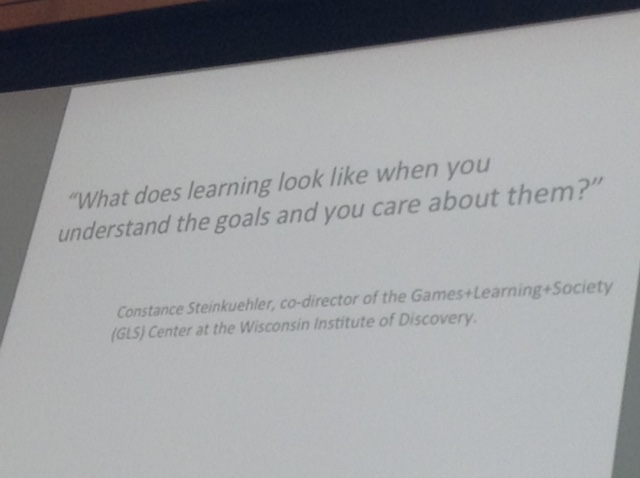Author Archive
Academy of distinguished teachers, Innovation
University of Minnesota, McNamara Alumni Center – Twin Cities Campus. April 8, 2015
Full program available here: https://guidebook.com/g/adt/
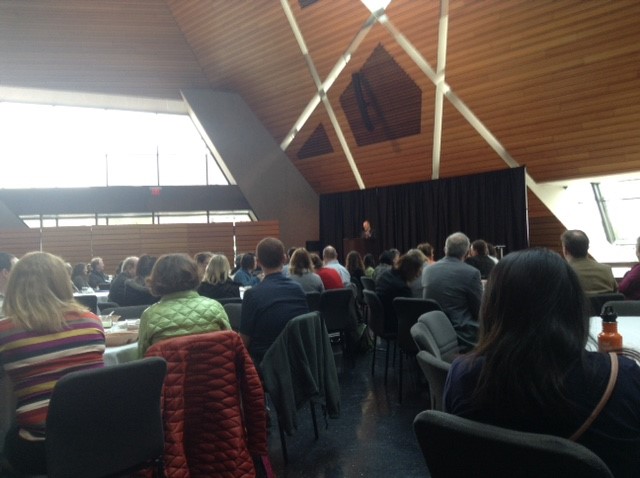
Randy Bass
Randy Bass
https://www.linkedin.com/pub/randall-bass/14/94/77
flipping disruption into Design
there are two type of universities: the ones that are in control of change and the ones, which are pressed to change.
what kind of education is needed at this moment of history.
Assumptions: 5-10 years will be for a first time outcompeted in terms of delivering information and degrees. What is that the university can do distinctively well that WWW cannot do: mentored learning and the arc of learning (beyond collection of granular separate learning)
book: The New Division of Labor. http://www.amazon.com/The-New-Division-Labor-Computers/dp/0691124027
External forces of potential disruption: 1. MOOCs, nearly free education, 2. skilled-based learning (Codeacademy, Udacity), 3. data analytic 4. public pressure on access, metrics of impact.
Gartner group (http://www.gartner.com/technology/home.jsp) hype cycle : overvalued in a short term and undervalued in a long term. MOOC is excellent example.
NMC: competing models of education.
learning analytics. adaptive learning, intelligent tutoring etc. Open Learning Initative. http://oli.cmu.edu/
In the 19th century, railroads companies which were in the business of railroad companies went under; the ones which were in the business of transportation survived. Parallel, universities, which are in the business of delivering information will die out; the ones, which will survive must look to a very different picture.
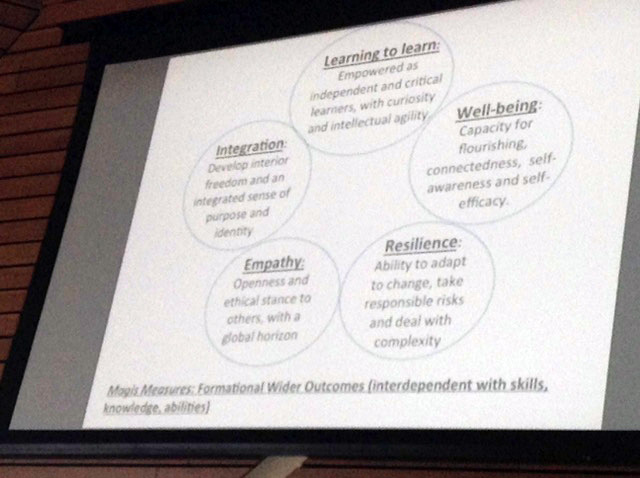
formative wider outcomes
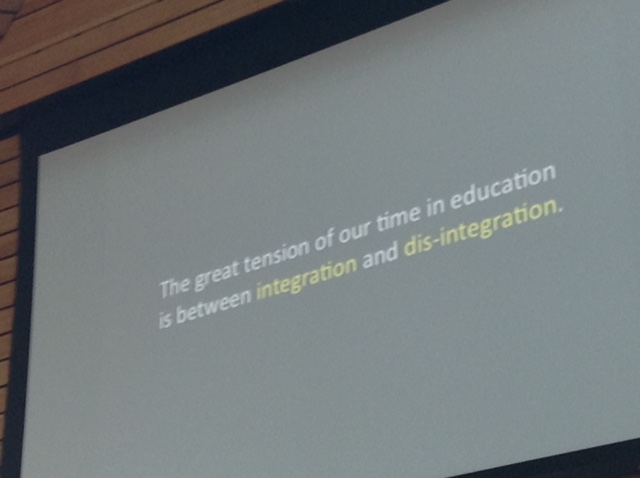
integration and dis-integration
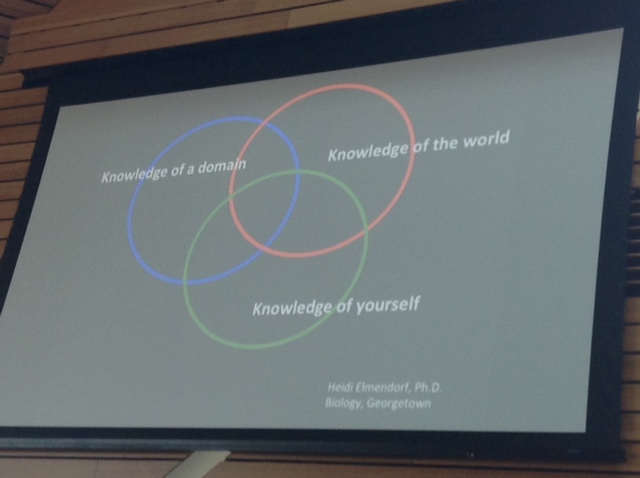
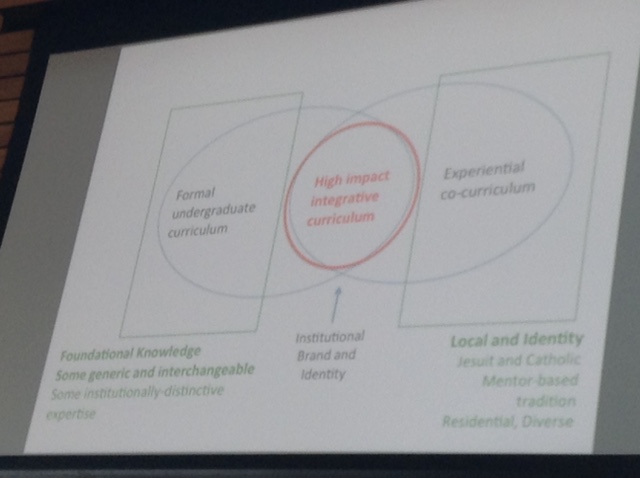
high impact integrative curriculum

what makes high inpact practices high impact
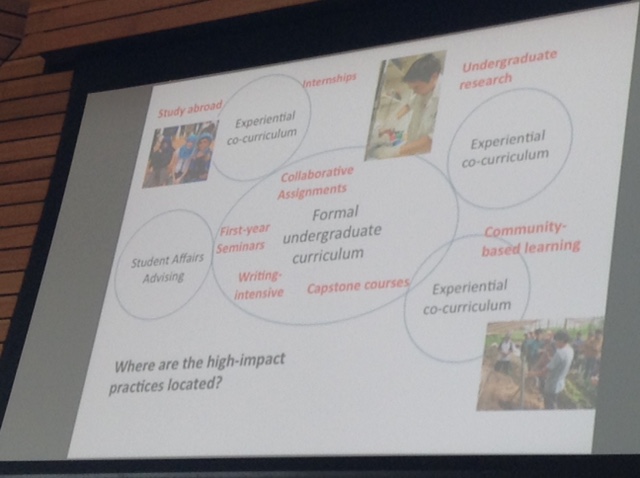
formal versus informal
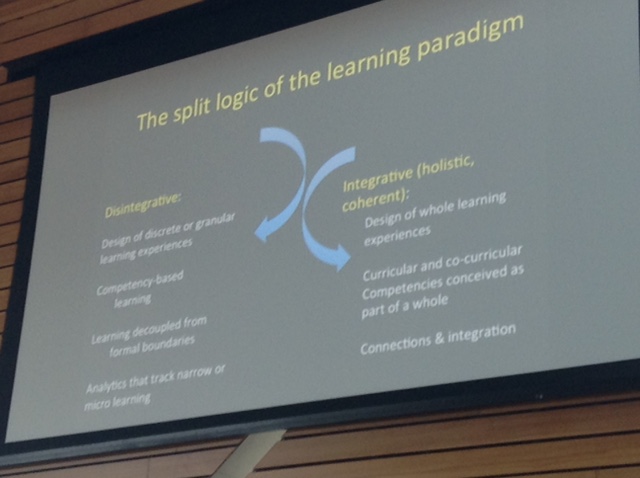
Selected sessions:
The Value of Assessing Outcomes of Teaching Methodologies to guide instructional design
https://guidebook.com/guide/33541/event/10594685/
game-based learning:
Upping your Game – Best Practices in Using Game-Based Learning
https://guidebook.com/guide/33541/event/10594684/
Implementing Game Dynamics in Moodle
https://guidebook.com/guide/33541/event/10693434/
visuals:
Engaging Students through Video Integration
https://guidebook.com/guide/33541/event/10676389/
https://guidebook.com/guide/33541/event/10676375/
Using Flipgrid Video Commentary to Share Student Learning
https://guidebook.com/guide/33541/event/10676361/
————
Enhancing learning with online narrated presentations using VoiceThread
https://guidebook.com/guide/33541/event/10676372/
flipped:
Essential Technology & Tools for Flipping Your Classroom
https://guidebook.com/guide/33541/event/10676385/
Improving Delivery of Technical Course Content through Incremental Use of Classroom “Flipping”
https://guidebook.com/guide/33541/event/10676376/
https://guidebook.com/guide/33541/event/10594850/
The Pros and Cons of Flipping the Classroom
https://guidebook.com/guide/33541/event/10676323/
Using Google Forms for Student Group Evaluations
https://guidebook.com/guide/33541/event/10734863/
Library:
The University Libraries Partnership for Affordable Content – Enhance Student Learning and Save Them Money!
https://guidebook.com/guide/33541/event/10676358/
CRS Tophat:
Using Classroom Debates as an Interactive Learning Tool in a Course on Companion Animal Ethical Issues
https://guidebook.com/guide/33541/event/10676369/
online:
Adapting the Harvard Case Method for Online Courses
https://guidebook.com/guide/33541/event/10595018/
Readiness Assessment for Online Courses
https://guidebook.com/guide/33541/event/10595040/

technology showcase general view
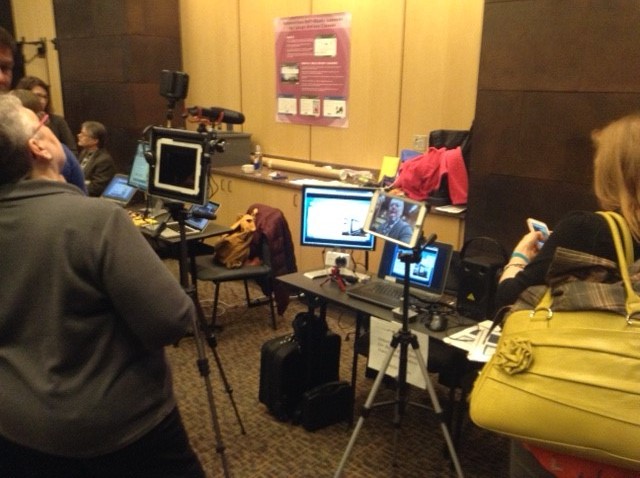
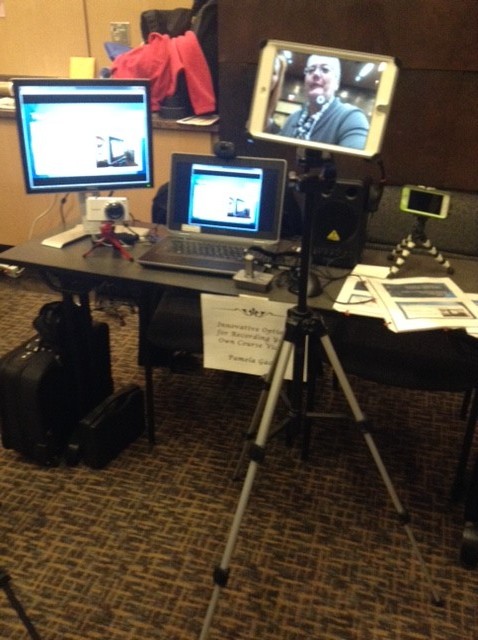
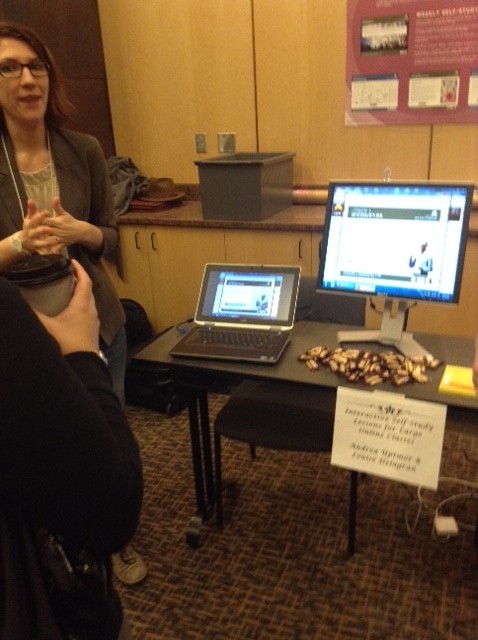


Gregory, S. (2015). Virtual World, Varsity Sport. Time, 185(12), 44.
http://time.com/3759634/virtual-world-varsity-sport/
http://login.libproxy.stcloudstate.edu/login?qurl=http%3a%2f%2fsearch.ebscohost.com%2flogin.aspx%3fdirect%3dtrue%26db%3dmih%26AN%3d101753558%26site%3deds-live%26scope%3dsite
Much like the way athletic-gear companies such as Nike and Adidas infiltrated traditional scholastic sports, video-game companies are helping underwrite the college gaming explosion. Riot Games, creator of League of Legends, is offering $360,000 in total scholarship money toplayers who make this year’s collegiate Final Four, more than tripling last year’s prize
My note: recommendation to LRS gaming committee. Can Eric be the LRS rep who can seek collecting an adhoc SCSU team? as per https://blog.stcloudstate.edu/ims/2015/03/19/recommendations-for-games-and-gaming-at-lrs/
If we to meet Dennis, Jim and/or Susantha, as recommended by Mark Vargas, the conversation needs to go that direction. Matt Barton definitely will be interested.
If we to consider the second and third higher level (how to gamify the educational process) or the educational methodology of gaming, I think we have to prepare the argument at LRS (as recommended by someone with a terminal degree in education or at least strong interest in pedagogy).
More on gaming at IMS blog
https://blog.stcloudstate.edu/ims/?s=gaming
more on gamification at IMS blog
https://blog.stcloudstate.edu/ims/?s=gamification
ALA’s GameRT is looking to organize preconferences at next year’s Midwinter and Annual ALA conferences. Last year at Annual we had Dr. Scott Nicholson run a preconference called Using Meaningful Gamification to Motivate Library Users. It was a great success and people enjoyed it a lot!
What we’re interested in hearing from you is what sorts of topics you’d like to see covered at a preconference. Once we get those ideas we’ll be able to find people capable of creating preconferences that you’ll find interesting and educational! So please, let us know any ideas that you have!
Please reply with your ideas offlist by emailing me at thematthewmurray@gmail.com
Apologies if this is too off topic, but I thought some of you might be able to provide some good suggestions.
-Matthew
RE.WORK Deep Learning Summit, Boston
May 26-27, 2015
Boston, Massachusetts
For a Better Flip, Try MOOCs
http://campustechnology.com/articles/2015/04/01/for-a-better-flip-try-moocs.aspx
by “MOOC-ifying” the large course, she was able to offer more in-class activities and standardize the student experience across sections.
802.11AC
http://en.wikipedia.org/wiki/IEEE_802.11ac
Campus Technology Whitepaper
Dear Plamen,
In the mobile era we live in, your students expect more from their institution’s wireless capabilities.
In this informative whitepaper, you’ll learn how deploying the first wireless standard (802.11 AC) where the speed of wireless is faster than a wired connection can empower your institution to meet the growing, technology driven landscape of today’s higher education environment.
My Note: Campuses are gearing up to the challenges of the Millennials and Gen Z. So do, allegedly, the SCSU IT. BOYD is now a term, which (finally, after 3 years of IMS proposing it to CETL) is waved forth and back at the SCSU campus in a lipservice attempt to convince stakeholders and public how much SCSU is with the times.
Once details transpire, however, one can see that 802.11AC allows 1GB connection and for the last 15 years, the SCSU IT never made it transparent (discussion? forget it), when 1 GB LAN will come to the campus. How can SCSU IT wave the BYOD flag, if older and more important issues are not resolved? Even if they are resolved, how does SCSU IT expect faculty to embrace the technology, if it is sold by the IT people? The sound pedagogical approach to new technologies must be done by faculty not by IT folks.
In order for BYOD, for that matter any other technology on campus to work (work means to a very large degree “accepted by educators,” the second most important stakeholder after the students – faculty – must be on board. Are they really on board controlled and dimmed by the SCSU IT?
Creating a Library App: Things to Know Before You Go Mobile
Tuesday, April 28, 2015 11AM-12PM PDT
Registration link: http://www.cla-net.org/?861
Mobile apps are a popular topic in libraries. But what does it take to create one and what kind of programming can you do with apps? Is an app the right solution, or should you create a responsive website? What is the process like, and what resources are needed? How do you manage privacy, security, and legal concerns? Who do you need to get the job done, and what skills should they have?
These are all important questions that should be asked (and answered) before you think about creating a mobile app. Learn from expert panelists from libraries and nonprofits who have created, developed, and managed mobile apps for their organizations. Panelists will share practical advice and information based on experience, as well as helpful tools and resources.
Zeth Lietzau is the Manager of Digital User Experience and the Community Technology Center at the Denver Public Library. He’s the leader of their Virtual Services initiative, which defines the direction of DPL’s online services, mobile & otherwise, including the Volume Denver project which is available as a mobile-responsive site.
A303_Lietzau Makers, Hackers, and Badges at the Denver Public Library
Anna Jaeger and her team at Caravan Studios create mobile apps that are designed in partnership with nonprofit and community-focused organizations to meet the needs of their constituents. Anna has been a frequent speaker on nonprofit and environmental technology since 2007. Prior to her work with Caravan Studios, Ms. Jaeger was a founder and co-director of TechSoup Global’s GreenTech initiative and the director of TechSoup Global’s IT Engineering department.
https://cc.readytalk.com/cc/s/meetingArchive?eventId=li2t1jz4hoy6
Ani Boyadjian has been a working librarian since 1990. An LAPL staffer since 1996, she is now Research & Special Collections Manager at the Los Angeles Public Library, where she also oversees the Library’s Digitization efforts. She most recently spearheaded the development of the ARchive LAPL app in a partnership with USC and app developers Neon Roots, to use augmented reality to tell stories about the historic Central Library.
More on mobile apps in general on this IMS blog:
https://blog.stcloudstate.edu/ims/?s=mobile+apps
Big Data is Finally Coming to Education Here’s What We’ve Learned So Far
http://www.edukwest.com/big-data-education/
Long lectures don’t work.
The best predictor of future course behavior is past course behavior.
Data from MOOCs suggest that one way to boost completion rates is to increase engagement early in the course.
Even in online courses, offline support is essential.
More IMS blog entries on Big Data:
https://blog.stcloudstate.edu/ims/?s=big+data
Institutional MOOC strategies in Europe
Status report based on a mapping survey conducted in October-December 2014
Institutional_MOOC_strategies_in_Europe (link to the PDF doc)
Darco Jansen
Programme manager EADTU
Coordinator OpenupEd, HOME and SCORE 2020
Robert Schuwer Expert Open Education Professor
OER, Fontys University of Applied Sciences, Eindhoven, Netherlands EADTU,February 2015 ISBN
978-90-79730-15-5

nstitutional profile in their MOOC offering compared between that of US survey (US 2013
and U
S 2014) and this survey (EU 2014)
.
p. 11 What is a MOOC?
It is important to note that MOOCs remain relatively poorly defined. MOOCs can be seen as a term or word related to the scalability of open and online education. Some even argue that it is a political
instrument and as such a concept that should be broadly defined.
MOOCs are “online courses designed for large numbers of participants, that can be accessed by anyone anywhere as long as they have an internet connection, are open to everyone without entry qualifications, and offer a full/complete course experience online for free”.
More on MOOC in this IMS blog:
https://blog.stcloudstate.edu/ims/?s=mooc
LITA discussion (attached below) on how one can easily do real-time but also big-data like estimate of patrons’ attendance in the library.
GitHub https://github.com/ and listuser@chillco.com Cary, for wifi connected counter
From: Cary Gordon [mailto:listuser@chillco.com]
Sent: Sunday, March 29, 2015 9:35 AM
To: lita-l@lists.ala.org
Subject: [lita-l] Re: patron/door counter
I am not an expert on door counters, but I think that it would be pretty simple — no, really — to make your own system using a small, inexpensive computer like a Raspberry Pi with a wifi adapter and connect it to your current counter. It would take a little programming, but the result could be something that the community could share.
If you are interested in this, we could create a project on GitHub. I would be happy to help.
Cary
On Mar 28, 2015, at 2:49 PM, Mason Yang <hyang@marymount.edu> wrote:
Hi,
We have a old door counter which can only be checked manually. We are looking for a new door counter system which can help us to find out how many patrons come in during certain hours. I found a couple systems online and would like know if some libraries recently installed any door counter systems and what’s your experience with them. I made a short list of questions below. If you can take a few minutes to answer those questions or just drop a line or two of your comments to reply to this email, I will really appreciate it.
Thanks in advance for your time and inputs!
- what’s the model and the brand of the door counter system?
- Wired to your network or wireless connected to the internet?
- Does the system count the number of entries/exists hourly?
- Dose the system generate reports,if any, automatically?
- What’s your general experience of the system?
- Will you recommend the system to other libraries?
Thanks,
—
Mason Yang
Electronic Services Librarian
Library & Learning Services
Marymount University
Phone: 703-526-6844
Fax: 703-284-1685
mason.yang@marymount.edu



